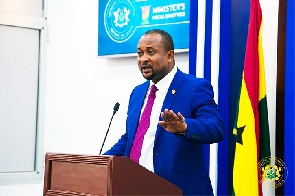The Deputy Minister of Information, Mr Pius Enam Hadzide, has stated that the government should invest in the state-owned media institutions because it is a responsibility that cannot be overlooked.
He said that in an era where technology has made the dissemination of information very easy, a validater is needed to check information, and a state-owned media house is the best the government can have.
This is because a state-owned media outlet is not profit driven and politically biased, and solely for the promotion of government policies, he said.
Mr Hadzide was speaking at a lecture organised by the Ghana Journalists Association (GJA) in anticipation of its 70th Anniversary celebration.
The lecture, which was centered on the theme: “Effective News Gathering and Dissemination for Democracy and Nation Integration: The Role of the Ghana News Agency”, looked at how the under-resourcing of the Ghana News Agency was affecting the dissemination of information from all over the country.
The Ghana News Agency (GNA) was established on March 5, 1957, on the eve of Ghana’s independence, and charged with the dissemination of truthful unbiased news. It was the first news agency to be established in Sub-Saharan Africa.
The GNA was part of a comprehensive communication policy that sought to harness the information arm of the state to build a viable, united and cohesive nation-state, hence the organisation has been operating in the unique role of mobilising the citizens for nation-building, economic and social development, national unity, and integration.
Due to this responsibility, the GNA is tasked to produce news from all corners of the country.
But, according the managers of the organisation, the GNA has, over the past twelve years, been under resourced, a phenomenon which is really affecting output.
Responding to these comments, the Deputy Minister said that the GNA, together with other state-owned media organisations, are under-resourced because the National Democratic Congress (NDC) party decided to marry the Information Ministry and Communication Ministry when it came into power.
He said the decision was what brought all the state-owned media outlets to their knees.
“The NPP government is not a government that came to power with a silver spoon in their mouth, but rather inherited some legacy challenges which would take some time to fix, and they are committed to fixing those challenges.
“All the state-owned institutions were on their knees when the government took over in 2017, including Ghanaian Times, Graphic Communications Group, Ghana Broadcasting Corporation and the Information Services Department.”
He, however, indicated that the NPP administration was a government that believes in media freedom.
He said the GJA edifice was gifted to the association by the NPP government during the Kufuor administration, as well as the repeal of the criminal libel law.
He also cited the recent passage of the Right to Information (RTI) bill, and opined that the NPP believes that the people of Ghana deserve to be informed on what their taxes are being used for, hence, the need to resource the state-owned media to drive that agenda.
He said investment into media institutions, both state and private, is a duty that the government has to perform.
Henceforth, the Ministry of Information would see to it that the GNA and other state-owned media house are back on their feet.
Talking about the GNA in particular, the Minister said that his ministry had tabled a proposal before Cabinet on how the GNA can be resourced and reinvested in to bounce back and perform its core mandate to the fullness.
General News of Thursday, 17 October 2019
Source: thechronicle.com.gh

















